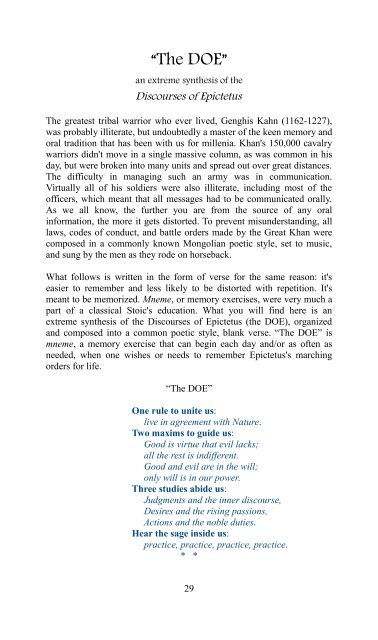The Stoic HANDBOOK - College of Stoic Philosophers
The Stoic HANDBOOK - College of Stoic Philosophers
The Stoic HANDBOOK - College of Stoic Philosophers
Create successful ePaper yourself
Turn your PDF publications into a flip-book with our unique Google optimized e-Paper software.
“<strong>The</strong> DOE”<br />
an extreme synthesis <strong>of</strong> the<br />
Discourses <strong>of</strong> Epictetus<br />
<strong>The</strong> greatest tribal warrior who ever lived, Genghis Kahn (1162-1227),<br />
was probably illiterate, but undoubtedly a master <strong>of</strong> the keen memory and<br />
oral tradition that has been with us for millenia. Khan's 150,000 cavalry<br />
warriors didn't move in a single massive column, as was common in his<br />
day, but were broken into many units and spread out over great distances.<br />
<strong>The</strong> difficulty in managing such an army was in communication.<br />
Virtually all <strong>of</strong> his soldiers were also illiterate, including most <strong>of</strong> the<br />
<strong>of</strong>ficers, which meant that all messages had to be communicated orally.<br />
As we all know, the further you are from the source <strong>of</strong> any oral<br />
information, the more it gets distorted. To prevent misunderstanding, all<br />
laws, codes <strong>of</strong> conduct, and battle orders made by the Great Khan were<br />
composed in a commonly known Mongolian poetic style, set to music,<br />
and sung by the men as they rode on horseback.<br />
What follows is written in the form <strong>of</strong> verse for the same reason: it's<br />
easier to remember and less likely to be distorted with repetition. It's<br />
meant to be memorized. Mneme, or memory exercises, were very much a<br />
part <strong>of</strong> a classical <strong>Stoic</strong>'s education. What you will find here is an<br />
extreme synthesis <strong>of</strong> the Discourses <strong>of</strong> Epictetus (the DOE), organized<br />
and composed into a common poetic style, blank verse. “<strong>The</strong> DOE” is<br />
mneme, a memory exercise that can begin each day and/or as <strong>of</strong>ten as<br />
needed, when one wishes or needs to remember Epictetus's marching<br />
orders for life.<br />
“<strong>The</strong> DOE”<br />
One rule to unite us:<br />
live in agreement with Nature.<br />
Two maxims to guide us:<br />
Good is virtue that evil lacks;<br />
all the rest is indifferent.<br />
Good and evil are in the will;<br />
only will is in our power.<br />
Three studies abide us:<br />
Judgments and the inner discourse,<br />
Desires and the rising passions,<br />
Actions and the noble duties.<br />
Hear the sage inside us:<br />
practice, practice, practice, practice.<br />
* *<br />
29

















